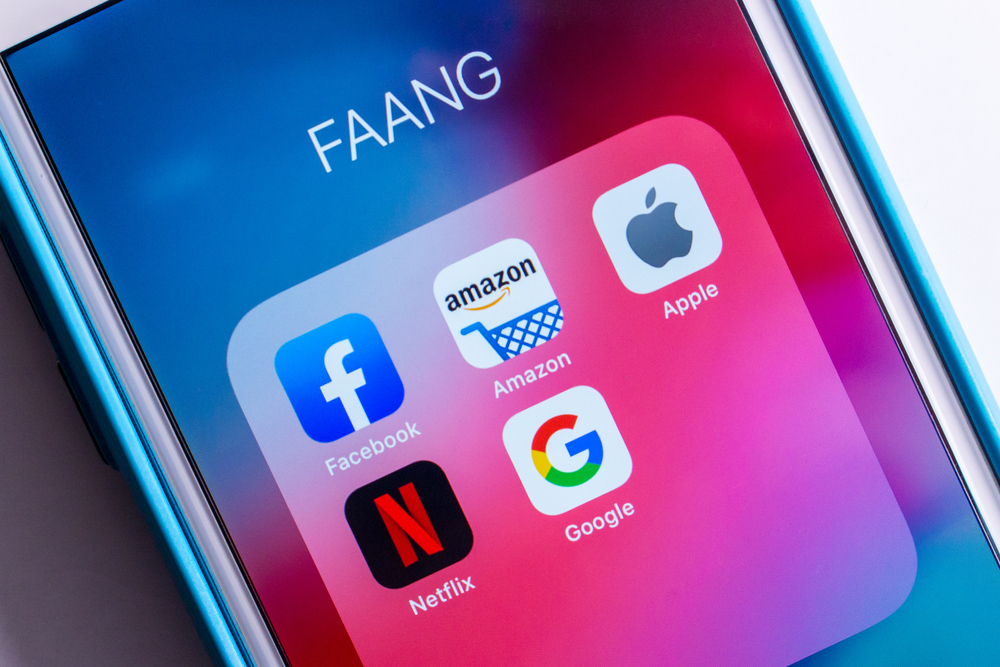What Is FAANG?
Facebook, Apple, Amazon, Netflix, and Google make up a group of stocks so popular that wall street has given them the name: FAANG. This group of tech giants have transformed the markets, their industry, and the way that we live. Five stocks having such an extreme presence makes for an unusual market. With such high market caps, they control a significant portion of the index and therefore can move it significantly.
Facebook (FB)
Facebook has the third largest market cap of the FAANG stocks. Facebook rocked the economic world with its ability to connect people and businesses. Facebook changed the way that businesses market to their consumers by allowing a reach that was unparalleled by traditional marketing methods.
The social networking and advertising platform has been plagued by privacy concerns and regulatory issues in recent years (does the 2016 election ring a bell?). Despite its recent criticisms, Facebook continues to grow through acquisitions and it still holds strong as one of the most influential stocks on the market. As of March 2019, it had a market cap of $473.59 billion.
Amazon (AMZN)
Amazon is the ultimate disruptor and has made its founder and CEO Jeff Bezos the richest man in the world. What started as an online bookshop has turned into billion-dollar ecommerce giant. As of March 2019, it had a market cap of more than $835 billion.
Amazon has totally changed the retail world and redefined what shopping means. The online retailer continues to enter and redefine a variety of industries.
Apple (APPL)
Apple is not an original FANG member, but the tech and software manufacturer is often included by investors due to its size and growth rates. Founded in 1976, Apple has taken over the personal technology market with its innovative gadgets and has developed a brand loyalty that is matched by few others. In August of 2018, Apple became the first US public company to be valued at over $1 trillion. While its value has fallen since then, as of March 2019 it still boasts a market cap of approx. $827 billion.
Netflix (NFLX)
With a market cap of just over $152 billion, Netflix seems like small fish when pitted against the likes of Amazon and Apple, but the streaming service is anything but. On-demand streaming services are a relatively new industry, but Netflix is the clear leader in an ever-growing marketplace. Netflix started in 1997 as an online mail order DVD store, but in 2007 came out with its streaming services. In doing so they quickly put an end to video stores (RIP Blockbuster) and redefined the way people consume media.
You’d be hard pressed to find anyone who doesn’t have a Netflix subscription these days. With their increasing production of original shows and movies, Netflix is overtaking the television and entertainment industry. Due to the relatively new concept of streaming, the company faces tough competitions from those looking to overtake the market, such as Amazon and Google.
Google (GOOGL)
Google was the first mover and an industry leader in advertising, web, and artificial intelligence services. The tech giant has taken over the marketplace with its offer of simple and convenient solutions to simple problems, such as scheduling, email, note taking, and translation… to name a few. While most of us associate it with being our go-to search engine, googles reach is much more extensive than that. Google.com is one of the most visited websites in the world and its rapid growth has triggered a chain of product developments, acquisitions, and affiliations. As of March 2019, Google had a market cap of $795.69 Billion.
These five stocks have significant influence in the markets and investors feel the effects of them whether they own shares of them or not. With the never-ending string of controversies and criticism that these companies face, many smaller tech companies have been able to make a mark in the tech sector. Only time will tell if FAANGs many rising competitors will be able to overthrow them and replicate the stunning growth that these five companies have achieved.


